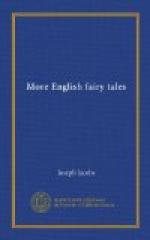Remarks.—An interesting example of the spread and development of a simple anecdote throughout England. Here again we can scarcely imagine more than a single origin for the tale which is, in its way, as weird and fantastic as E.A. Poe.
LXXV. TAMLANE
Source.—From Scott’s Minstrelsy, with touches from the other variants given by Prof. Child in his Eng. and Scotch Ballads, i., 335-58.
Parallels.—Prof. Child gives no less than nine versions in his masterly edition, l.c., besides another fragment “Burd Ellen and Young Tamlane,” i., 258. He parallels the marriage of Peleus and Thetis in Apollodorus III., xiii., 5, 6, which still persists in modern Greece as a Cretan ballad.
Remarks.—Prof. Child remarks that dipping into water or milk is necessary before transformation can take place, and gives examples, l.c., 338, to which may be added that of Catskin (see Notes infra). He gives as the reason why the Elf-queen would have “ta’en out Tamlane’s two grey eyne,” so that henceforth he should not be able to see the fairies. Was it not rather that he should not henceforth see Burd Janet?—a subtle touch of jealousy. On dwelling in fairyland Mr. Hartland has a monograph in his Science of Fairy Tales, pp. 161-254.
LXXVI. THE STARS IN THE SKY
Source.—Mrs. Balfour’s old nurse, now in New Zealand. The original is in broad Scots, which I have anglicised.
Parallels.—The tradition is widespread that at the foot of the rainbow treasure is to be found; cf. Mr. John Payne’s “Sir Edward’s Questing” in his Songs of Life and Death.
Remarks.—The “sell” at the end is scarcely after the manner of the folk, and various touches throughout indicate a transmission through minds tainted with culture and introspection.
LXXVII. NEWS!
Source.—Bell’s Speaker.
Parallels.—Jacques de Vitry, Exempla, ed. Crane, No. ccv., a servant being asked the news by his master returned from a pilgrimage to Compostella, says the dog is lame, and goes on to explain: “While the dog was running near the mule, the mule kicked him and broke his own halter and ran through the house, scattering the fire with his hoofs, and burning down your house with your wife.” It occurs even earlier in Alfonsi’s Disciplina Clericalis, No. xxx., at beginning of the twelfth century, among the Fabliaux, and in Bebel, Werke, iii., 71, whence probably it was reintroduced into England. See Prof. Crane’s note ad loc.
Remarks.—Almost all Alfonsi’s exempla are from the East. It is characteristic that the German version finishes up with a loss of honour, the English climax being loss of fortune.




